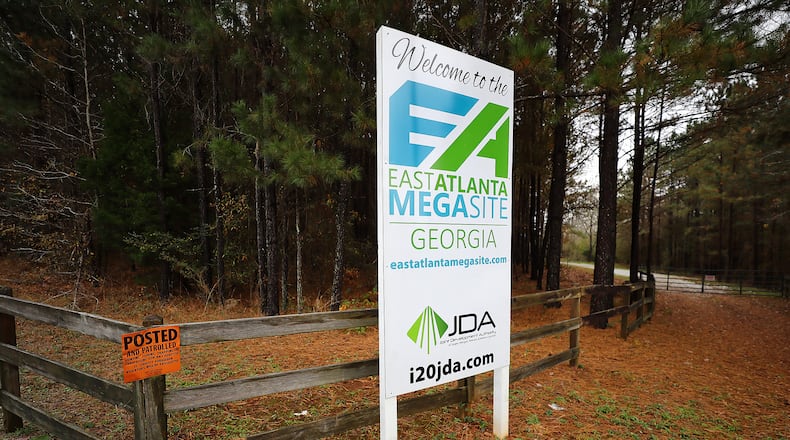Georgia plans to announce next week it has landed a factory from well-financed electric vehicle startup Rivian, a deal that officials hope will make the state a leader in the next generation of the automotive industry, The Atlanta Journal-Constitution has learned.
Gov. Brian Kemp and Rivian officials are expected to hold a ceremony next Thursday to outline the project, according to two senior officials with direct knowledge of the negotiations.
Rivian has been in talks to develop a site along I-20 straddling Walton and Morgan counties about an hour’s drive east of Atlanta, between the cities of Social Circle and Rutledge, according to people familiar with the matter.
The company has been seeking a second U.S. manufacturing site to build vans, SUVs and trucks where it would employ thousands. The plant would rank as one of Georgia’s largest-ever economic development projects.
A spokeswoman for Irvine, California-based Rivian declined to comment. Georgia officials have declined to comment publicly on the talks.
The project is said to be a multibillion-dollar investment that would ultimately produce 200,000 vehicles a year and employ perhaps 8,000 people at full production before the end of the decade.
The Rivian factory would be the first automotive assembly facility in Georgia since Kia Motors announced in 2006 it would build a plant in West Point near the Alabama border. It also follows decades of recruiting near misses after several large traditional automakers chose to build manufacturing plants in neighboring states.
The AJC first reported details of the negotiations on Nov. 15.
EVs make up just 2% of auto sales today but are expected to grow exponentially amid tightening fuel standards, lower costs of production and consumer shifts to more environmentally friendly transportation.
Rivian started delivering its first vehicles in September. The company went public in November and was valued on Friday at about $95 billion, greater than that of General Motors or Ford, in part because Wall Street sees Rivian as a potential leader in the electric future.
Ambitious goals
Rivian has ambitious goals but a steep climb to reach them while facing challenges by Tesla and other established industry players who are also investing billions in EVs.
State officials identified Rivian earlier this year as one of its biggest economic development targets and prepared a bounty of incentives likely to be valued well into the hundreds of millions of dollars in grants, worker training, tax credits and other perks. The details of those incentives are not fully known.
Auto plants are coveted for the jobs they create and the potential for thousands more from suppliers. Critics say automakers often pit states against one another in expensive bidding wars for factories when factors like workforce and supply chain play far bigger roles in a company’s decision-making.
The AJC first reported Georgia’s pursuit of Rivian in July. In November, the AJC first reported Rivian was in late-stage negotiations with the state and county leaders east of Atlanta while simultaneously in discussions with other states, including Texas.
Kemp will no doubt tout the Rivian investment as a testament to his management of the economy as he faces a difficult re-election next year, including a primary challenge from former CEO and U.S. Sen. David Perdue and a potential rematch with 2018 rival Stacey Abrams.
The factory site is said to include 1,978 acres marketed as the “East Atlanta Megasite,” one of the largest available industrial sites in the state. The Joint Development Authority of Jasper, Morgan, Newton & Walton Counties, a government economic development agency, has approached multiple property owners to sell land near the megasite, according to five people who spoke to the AJC.
The East Atlanta Megasite and other industrial properties in the area also have important rail connections.
Optimism and angst
Many residents in the Rutledge area have cited concerns about changes the factory could make to the rural character of the area.
Felton Jenkins, who lives in Washington state, but whose family has owned farmland near the proposed factory site for generations, wrote Rivian CEO R.J. Scaringe urging the company to look elsewhere.
“Our family didn’t buy and continue to own farmland here because we were hoping a massive car plant would open across the street,” he said, raising concerns about environmental damage. Just as Rivian has refurbished an old car plant in Illinois, Jenkins urged Rivian to redevelop an existing industrial site for its next plant.
Though an early darling of Wall Street, Rivian is not yet a household name like its larger electric rival Tesla. After a dozen years in development, the company only started delivering its first vehicles this autumn from its initial factory in Illinois.
Rivian’s early investors include T. Rowe Price, Amazon and Ford Motor.
Cox Enterprises, owner of the AJC, owns a 4.7% stake in Rivian and supplies services to Rivian. Sandy Schwartz, a Cox executive who oversees the AJC, is on Rivian’s board of directors and holds stock personally. He does not take part in the AJC’s coverage of Rivian.
Credit: Curtis Compton / Curtis.Compton@
Credit: Curtis Compton / Curtis.Compton@
Rivian will be judged not only by the quality of its vehicles, but its ability to deliver on the promises already made.
Amazon, one of its large investors, has a deal to acquire 100,000 Rivian delivery vans by 2030.
Rivian also says it has 55,000 combined pre-orders for its luxury R1T pickup and R1S sports utility vehicle. It has a goal of 1 million EV sales per year by decade’s end. The Georgia plant and likely other future assembly facilities will be vital to meeting those goals.
Georgia has deep ties with the auto industry, dating to a Ford plant in 1915. Though Georgia boasts just one automotive assembly plant today in Kia, it has a vast network of parts suppliers that employs tens of thousands and is the home of bus maker Blue Bird in Fort Valley.
In 2018, Georgia nabbed its biggest automotive prize since Kia when SK Battery America announced plans for a battery plant in Jackson County north of Atlanta. The plant, valued at $2.6 billion, will make the heart of what propels EVs.
Keep Reading
The Latest
Featured








